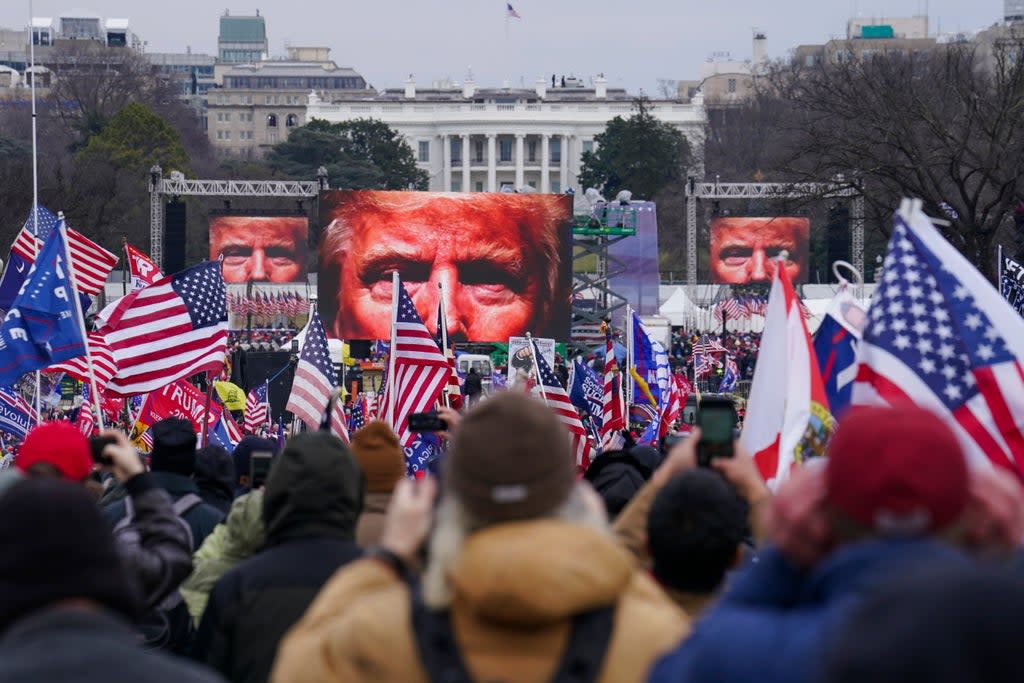Two dozen Republican ex-lawmakers say Trump did play a role in Capitol riot

- Oops!Something went wrong.Please try again later.
- Oops!Something went wrong.Please try again later.
Sixty-six former members of Congress — including 24 ex-GOP representatives — are urging a federal judge to reject the lawsuit former president Donald Trump filed in hopes of blocking the House committee investigating the 6 January insurrection from accessing White House documents held by the National Archives.
In a friend-of-the-court brief filed on Thursday, the former representatives argue that because Mr Trump “played an outsized — and likely central — role in orchestrating the events that led to the January 6th attack,” the White House records sought by the committee are “likely” to contain documentation of the “means he used or contemplated” in his attempt to prevent Congress from certifying President Joe Biden’s electoral college victory.
The former president’s actions “leading up to and on January 6th,” they wrote, unfolded “like a fever dream in James Madison’s imagination,” and “tested our constitutional system in ways that no prior occupant of the Office of President of the United States ever had”.
“Taken together, Mr. Trump’s public and private actions—some of which are now known, but others of which surely remain unknown—came far closer to blocking a peaceful transfer of power and imperiling the lives of Senators, Representatives, and the Vice President of the United States,” they continued, “than [the former members], with their over 850 combined years of congressional service, could have ever imagined”.
Mr Trump filed his lawsuit on 18 October after Mr Biden declined his predecessor’s request for him to invoke executive privilege to prevent the National Archives and Records Administration from giving the committee access to Trump administration records — such emails, phone logs, calendars, memoranda and other documents — created over the days and weeks leading up to the worst attack on the Capitol since the British Army set fire to it in 1814.
According to documents filed with the court by Nara, Mr Trump is seeking to prevent the House committee from gaining access to 770 of the 1024 pages of records which agency officials have found to be responsive to the committee’s request, including drafts of the speech he delivered on 6 January, handwritten notes from ex-Chief of Staff Mark Meadows’ former files “listing potential or scheduled briefings and telephone calls concerning the January 6 certification and other election issues,” and draft executive orders and presidential findings “concerning the security of the 2020 presidential election and ordering various actions”.
While such documents would ordinarily be protected from disclosure to Congress, White House Counsel Dana Remus informed Nara last month that Mr Biden decided to not shield the records from view and break from the executive branch’s traditional reluctance to waive privilege due to the “unique and extraordinary circumstances” presented by the events of that day.
In a letter to Archivist of the United States David Ferriero, Ms Remus wrote that Mr Biden determined that “an assertion of executive privilege is not in the best interest of the United States, and therefore is not justified”.
But Mr Trump, who to date has denied having actually lost the election and currently styles himself as the “45th President of the United States” rather than a former president, claims that he retains the power to invoke executive privilege to prevent documents from being released and former aides from testifying. One former adviser, podcast host Steve Bannon, has already been referred to the Justice Department for contempt of Congress, while others — such as Mr Meadows — appear to be drawing out their negotiations with the committee to delay proceedings.
In his request for the court to enjoin Nara from turning the records over to the committee, the twice-impeached ex-president argued that allowing Mr Biden to waive executive privilege (as is his right) over his predecessor’s objection would make future presidential advisers reluctant to provide candid advice.
Yet the former members of Congress say that the danger presented by what happened on 6 January necessitates a full investigation, regardless of any privilege claims.
“If traitors bent on disrupting and damaging our government were to meticulously plan and nearly succeed in flying a jumbo jet into the White House, we would not expect Congress to implement stronger safeguards without the opportunity to investigate the attackers. And we certainly would not expect Congress to sit on its hands when it comes to such an important matter of national security,” they wrote.
“Under these circumstances, no personal interests of Mr Trump or disputed and unresolved questions of executive privilege could possibly tilt the scales against disclosing these records to the Select Committee”.

